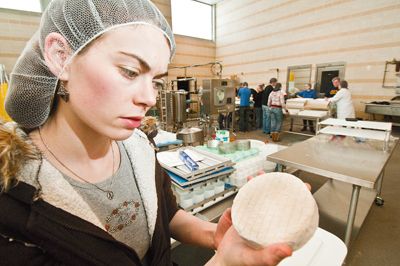Curd Nerds and Whey

By Christine Hyatt
The renaissance of cheesemaking in Oregon has been a marvelous thing to behold. Over the last decade, the number of artisan and farmstead creameries has risen from five in the early 2000s to more than 20 today, a pace matched by few other states.
Beyond high quality milk and enthusiastic consumer support, the secret weapon in the meteoric rise of Oregon cheese is the century-old dairy program at Oregon State University. Since the early 1900s, university extension agents and professors have worked with producers and processors, helping increase quality and production of healthful, flavorful dairy products.
Throughout the ’50s and ’60s, the OSU dairy plant served as a training ground for dairy professionals who went on to careers in fluid milk, butter, yogurt, cheese and ice cream production throughout the Northwest. In the late ’60s, the pilot plant was shuttered and fell into disrepair for several decades.
“About 30 years ago, OSU had a very nice, functioning dairy plant,” said Professor Lisbeth Goddik, OSU dairy foods specialist and extension agent. “It was a great training facility and most of the people who worked in the dairy industry in Oregon and even Washington got their training with (Professor Emeritus) Floyd Bodyfelt at OSU.”
Upon her arrival at the university, Goddik worked with the school and Oregon Dairy Industries, an organization that promotes and elevates Northwest dairy, to revitalize the dairy plant with a special focus on artisan cheese.
“We now have a nice facility, and people can come make dairy products and sell them,” Goddik said. “They can get their business started here and see if they can make good quality products before they invest all the money needed to start up a dairy plant.”
University students also attend workshops and learn how to make ice cream and cheese. Goddik notes, “This is a great way to motivate the students to consider careers in dairy. If they like making the products, it’s more likely they’ll explore it as a career.”
The school hosts a number of educational classes for the general public and extension classes for producers held around the state. These classes provide ongoing technical and food safety training focused on sanitation and milk quality.
In late 2010, Paul and Sandra Arbuthnot endowed the Paul G. and Sandra A. Arbuthnot Professorship Fund and the Arbuthnot Dairy Center. He is a retired president of Portland-based Sunshine Dairy and past president of Quality Chekd Dairies.
The endowment allows for increased direct outreach to Oregon dairy artisans and processors. At a time when many Dairy Science programs are closing due to lack of funding, the $830,000 donation will ensure consistent, quality educational opportunities into the future.
On the horizon, OSU students and members of the Oregon and Northwest cheese community can look forward to a November workshop with Sebastien Roustel, a dairy scientist from France’s prestigious Pouligny dairy school. In January, Cheesemaker Education Day will feature a keynote and evaluation by noted expert Peter Dixon from Vermont.
OSU will soon release a decision-making tool to assist start-ups in the all-important planning stage. “Based on what I’ve seen, cheesemakers work really hard but can’t make money because they started too small and make the wrong types of cheese,” Goddik said. “This tool will help them decide how large they need to be to break even, what cheeses they should make for maximum return and how to distribute.”
It seems only fitting that an educational center focused on cheese would also produce cheese both as a teaching tool and as a revenue generator. Together with Creamery Manager Marc Bates, formerly of WSU, Goddik has created a new cheese, which will be released in conjunction with OSU Homecoming, the weekend of Nov. 4 and 5.
A competition was held over the summer to develop a label and name for the new cheese. Three finalists have been selected from the 28 entries, and students will vote on the winner. As to the style of the limited-production cheese, everything is secret right now. Goddik notes, “All I will say is that I have a certain weakness for French cheese.”
Public-private partnerships like those forged between OSU and the artisan cheese community will undoubtedly lead to new advances in cheese safety, flavor and variety in the state.
Goddik sees a trajectory similar to the state’s wine industry: “I could see dozens of small creameries producing cheese in Oregon. Much like the wine industry, instead of comparing one Pinot Noir to another, visitors might compare an Oregon Gouda or soft-ripened cheese to another, especially as agritourism grows.”
Christine Hyatt is a cheese-obsessed writer and video producer. Follow her on Facebook and Twitter, @cheesechick1.












